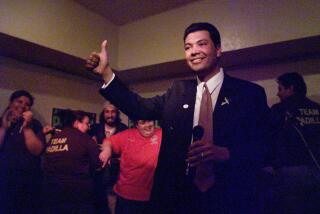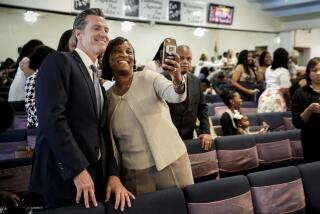Ex-Rep. Mineta Nominated for Cabinet Post
WASHINGTON — With 207 days left in office, President Clinton said Thursday that he would nominate Norman Y. Mineta, who represented the Silicon Valley in Congress for 21 years, to be secretary of commerce. If confirmed by the Senate, Mineta would be the first Asian American member ever to serve in any president’s Cabinet.
The barely half-year of tenure open to him, unless he is renominated by the next president, makes the appointment seem largely symbolic. Mineta is of Japanese American heritage--as a 10-year-old, he lived behind the barbed wire of a World War II internment camp in Wyoming--and is fluent in the high-tech language of Silicon Valley.
But the former congressman, 68, suggested that he sees his role as something more than that of a caretaker.
“Some might say that the months remaining in this administration is not a lot of time to make a difference in the life of our nation. But I disagree. Six months is a virtual eternity in the new economy,” he said, earning a chuckle from the president during the Oval Office ceremony at which his nomination was announced.
President Clinton praised him as “a highly skilled negotiator in Washington and throughout the world.”
“He will play a crucial role in keeping our economic strategy on track, opening trade around the world, investing in our people, promoting high technology, bridging the digital divide,” Clinton said. “He brings an in-depth understanding of American business and a strong sense of the needs of our high-tech economy.”
A former mayor of San Jose and former chairman of the House Public Works and Transportation Committee, Mineta would replace William M. Daley, who resigned to become chairman of Vice President Al Gore’s presidential campaign.
Mineta’s confirmation is not expected to face opposition in the Senate.
“It’s a good choice,” Senate Majority Leader Trent Lott (R-Miss.) said. “I want to make sure that there’s nothing that he’s been involved in since he left the Congress that would be a problem. But I think generally there’s going to be a positive reaction. We all know him and knew him to be an effective legislator.”
Sen. Dianne Feinstein (D-Calif.) praised Mineta’s “tremendous skills and qualifications” and his record favoring increased research and development and a decrease in trade barriers.
The nominee left the House of Representatives in 1995 to become a senior vice president of Lockheed Martin, the huge defense contractor.
Mineta’s expressions of enthusiasm notwithstanding, his new position is seen by many observers as one largely reflecting the political realities facing the president and the vice president with fewer than five months until election day.
Clinton’s choice of an Asian American who is also a Californian “suggests the president needs to shore up [Gore’s] position in California,” said Peter Morici, a senior fellow at the Economic Strategy Institute, a Washington policy research organization. “He doesn’t have many high-profile appointments he can make.”
So, with little hope of accomplishing major deeds at the Commerce Department, Clinton has opted to use the nomination for its political side effect, Morici said.
One former senior administration official, looking at the awkwardness of filling such a senior position so late in the term, said: “If you were Clinton and said to yourself ‘Somebody’s got to do it,’ the only upside is to pick someone from Silicon Valley.” The message is one of attention to the high-tech community, which is considered up for grabs in the presidential election.
And for that, Mineta--his recent years dealing with transportation issues at Lockheed notwithstanding--fits the bill, said Dave McCurdy, a Democratic colleague of Mineta in Congress who is now president of the Electronic Industries Alliance.
“Norm Mineta brings a very broad perspective, having been mayor of San Jose, a member of Congress known for understanding technology and all the ramifications associated with the high-growth economy we’ve seen in the last decade,” McCurdy said.
While acknowledging that there is little Mineta could accomplish in seven months, McCurdy said that the Cabinet position would make him a more valuable surrogate campaigner for Gore among Asian American voters.
“He has a reach into the Asian community that is very solid,” McCurdy said. As a member of Congress, he played a central role in the passage of legislation in 1988 providing an apology and compensation for the survivors of the wartime internment camps.
At the same time, McCurdy said, Mineta’s new role gives him the opportunity to present the outlines of the next administration’s decisions touching on high-tech issues and efforts to retain high economic growth.
“There still isn’t an understanding of the complexity and interconnection of these issues,” said McCurdy. “There’s a need for an articulate spokesman who can identify these issues and address them.”
Recalling his days as an internee, Mineta said: “Some say the internment was for our own good. But even as a boy of 10, I could see that the machine guns and the barbed wire faced inward.”
He and his family spent four years in the camp. They lost their home in San Jose, as well as his father’s insurance business.
Mineta graduated with a business degree from UC Berkeley in 1953 and then served a hitch in the U.S. Army. He later owned his own insurance business in San Jose. He has two sons.
The first Japanese American elected to Congress from the mainland United States, Mineta was part of the 1974 Watergate class of Democratic reformers.
Clinton offered Mineta a Cabinet post once before. When Clinton took office in 1993, he offered Mineta the job of Secretary of Transportation. But Mineta turned down the post so he could head the House Public Works Committee.
(BEGIN TEXT OF INFOBOX / INFOGRAPHIC)
Profile:
Norman Y. Mineta
If confirmed by the Senate, Mineta would become the nation’s 33rd secretary of commerce and the first Asian American Cabinet member.
* Born: Nov. 12, 1931 Age: 68
* Residence: Bethesda, Md.
* Education: Earned a business degree in 1953 from UC Berkeley.
* Career highlights: Army intelligence officer in Korea. Elected to San Jose City Council in 1967; became that city’s mayor in 1971. Elected to Congress in 1974 and served for 21 years. Left Congress in 1995 to join Lockheed Martin Corp. as senior vice president.
* Quote: “Some might say that the months remaining in this administration is not a lot of time to make a difference in the life of our nation. But I disagree. Six months is a virtual eternity in the new economy.”
More to Read
Get the L.A. Times Politics newsletter
Deeply reported insights into legislation, politics and policy from Sacramento, Washington and beyond. In your inbox three times per week.
You may occasionally receive promotional content from the Los Angeles Times.










